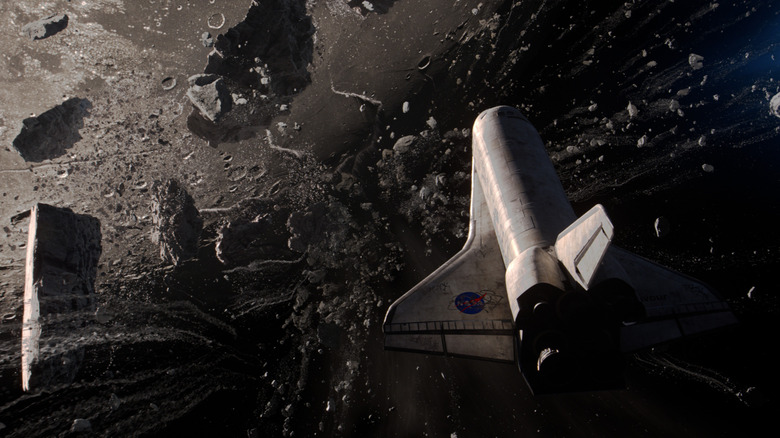Roland Emmerich On The Inspiration Behind Moonfall - Exclusive
Director Roland Emmerich never met a conspiracy theory he didn't like — at least when it comes to making his blockbuster disaster and sci-fi movies. Think about the longstanding rumors about alien spacecraft stashed in Nevada's Area 51 that were part of "Independence Day," or the alleged Mayan prophecy about the end of the world that fueled "2012." And let's not forget the speculation about who really wrote Shakespeare's plays that drove the plot of "Anonymous."
In his new film "Moonfall," Emmerich channels yet another wild theory: that the Moon is not actually a naturally formed object, but an artificial construct known as a "megastructure." Who or what is behind its actual creation, and their plans for the future of humanity, forms the basis of "Moonfall," in which a swarm of nanobots invades the Earth's only satellite and sets off a series of events that sends it hurtling toward our homeworld.
Now, conspiracy theories aren't exactly helpful these days (remember that microchip that was supposedly being implanted in everyone's bodies via the COVID vaccine?), but they can make for a fun rollercoaster ride of a movie — especially with a director like Emmerich going all in. "I still don't believe that the Moon is artificial," the filmmaker tells Looper. "But it's just buying into it and [doing] some sort of explaining to people with a twinkle in your eye, [and still being] as accurate as possible."
Where did Roland Emmerich get the crazy idea for Moonfall?
The idea that the Moon is an artificial construct — presumably built by aliens — is not exactly new. Sci-fi writer H.G. Wells first posited the idea in his 1901 book, "The First Men in the Moon," and various theories about the Moon being hollow or some kind of alien observatory have circulated for years. Roland Emmerich says it was a more recent 2006 tome that first sparked his imagination.
"I read, 10 years ago, a book called 'Who Built the Moon?' and it was such a provocative book," he explains. "Every time I looked at the Moon, I was reminded that I read that book, and slowly out of that came this idea: 'What if something happens to the Moon and it falls on Earth, and at the same time, we learn that the Moon is not natural, it's actually built?' That was a cool idea."
The concept of an artificial intelligence from deep space being behind the Moon's plunge is a remnant of a project called "Singularity" that Emmerich almost made a decade ago. "Yes, it was a lot of that theme," he recalls. "There's also a great book called "Homo Deus" which talks about the same thing ... they cannot just create artificial intelligence and give control to that entity. It could be a disastrous thing."
Although the concepts behind "Moonfall" are wildly inconceivable, Emmerich always consults with experts at places like NASA or Jet Propulsion Laboratory to make sure that there is some basis in real science in his movie — even if the idea is not to be taken too seriously.
"When [it's] not all really well researched, people will start asking too many questions, and even then they will still ask a lot of questions," he says. "I still don't believe that the Moon is artificial, but it's just buying into it and [doing] some sort of explaining to people with a twinkle in your eye, [and still being] as accurate as possible."
"Moonfall" is now playing in theaters.

